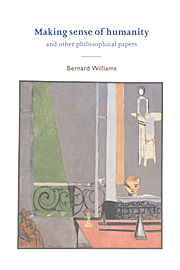Book contents
- Frontmatter
- Contents
- Preface
- I Action, freedom, responsibility
- II Philosophy, evolution, and the human sciences
- III Ethics
- 13 The point of view of the universe: Sidgwick and the ambitions of ethics
- 14 Ethics and the fabric of the world
- 15 What does intuitionism imply?
- 16 Professional morality and its dispositions
- 17 Who needs ethical knowledge?
- 18 Which slopes are slippery?
- 19 Resenting one's own existence
- 20 Must a concern for the environment be centred on human beings?
- 21 Moral luck: a postscript
- Index
16 - Professional morality and its dispositions
Published online by Cambridge University Press: 28 January 2010
- Frontmatter
- Contents
- Preface
- I Action, freedom, responsibility
- II Philosophy, evolution, and the human sciences
- III Ethics
- 13 The point of view of the universe: Sidgwick and the ambitions of ethics
- 14 Ethics and the fabric of the world
- 15 What does intuitionism imply?
- 16 Professional morality and its dispositions
- 17 Who needs ethical knowledge?
- 18 Which slopes are slippery?
- 19 Resenting one's own existence
- 20 Must a concern for the environment be centred on human beings?
- 21 Moral luck: a postscript
- Index
Summary
A leading example of a ‘professional morality’, the one that I shall have in mind for this discussion, is that of lawyers, particularly as that profession is practised in the United States, but many of the considerations apply more widely.
What gives interest to the idea of a professional morality is the possibility that such a morality may diverge from ‘ordinary’ or ‘everyday’ morality. Indeed, it is this possibility that gives content to the idea of a professional morality at all, as opposed merely to a set of conventions or styles of etiquette associated with certain professions. Such divergences are a datum of the problem, but it is not entirely clear at a theoretical level how they are to be described. Divergences, first of all, do not necessarily generate conflict, though I shall argue later that they involve the possibility of conflict. They do not necessarily produce conflict in the professional agents themselves, since those agents may be totally at home in their professional morality and assuredly discriminate professional situations from others, and so on. Moreover, if others in the community equally accept the existence of the professional morality, there will be no conflict between those other people and the professionals.
First-person conflict within members of the profession and conflict between them and other people are of course both possible, and they are in principle independent of each other. Professionals who are complacent or convinced, or both, may be surrounded by a dubious public; on the other hand, it may be the professionals, or some of them, who are worried, and the public reassuringly traditionalist.
- Type
- Chapter
- Information
- Making Sense of HumanityAnd Other Philosophical Papers 1982–1993, pp. 192 - 202Publisher: Cambridge University PressPrint publication year: 1995
- 7
- Cited by



